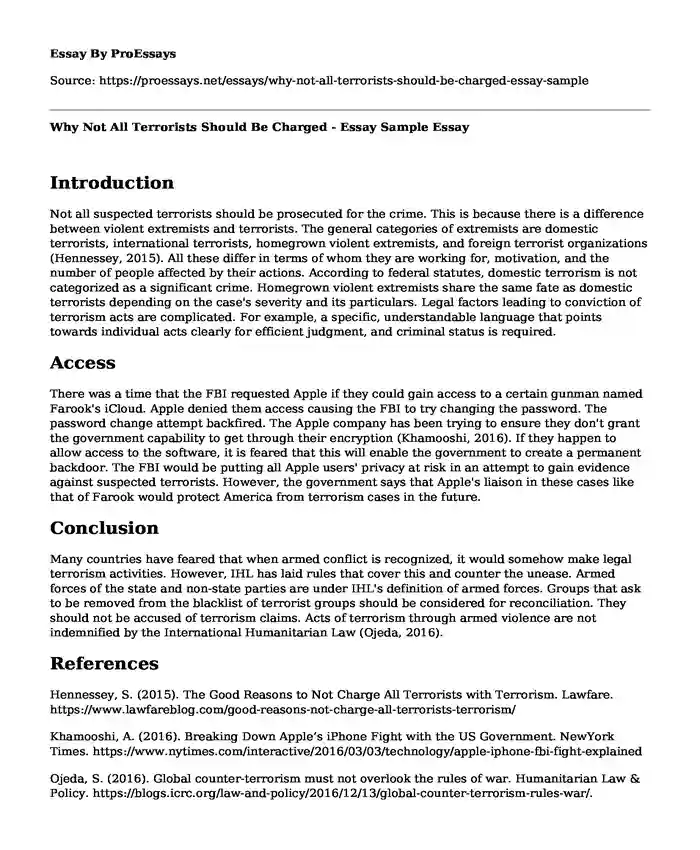Introduction
Not all suspected terrorists should be prosecuted for the crime. This is because there is a difference between violent extremists and terrorists. The general categories of extremists are domestic terrorists, international terrorists, homegrown violent extremists, and foreign terrorist organizations (Hennessey, 2015). All these differ in terms of whom they are working for, motivation, and the number of people affected by their actions. According to federal statutes, domestic terrorism is not categorized as a significant crime. Homegrown violent extremists share the same fate as domestic terrorists depending on the case's severity and its particulars. Legal factors leading to conviction of terrorism acts are complicated. For example, a specific, understandable language that points towards individual acts clearly for efficient judgment, and criminal status is required.
Access
There was a time that the FBI requested Apple if they could gain access to a certain gunman named Farook's iCloud. Apple denied them access causing the FBI to try changing the password. The password change attempt backfired. The Apple company has been trying to ensure they don't grant the government capability to get through their encryption (Khamooshi, 2016). If they happen to allow access to the software, it is feared that this will enable the government to create a permanent backdoor. The FBI would be putting all Apple users' privacy at risk in an attempt to gain evidence against suspected terrorists. However, the government says that Apple's liaison in these cases like that of Farook would protect America from terrorism cases in the future.
Conclusion
Many countries have feared that when armed conflict is recognized, it would somehow make legal terrorism activities. However, IHL has laid rules that cover this and counter the unease. Armed forces of the state and non-state parties are under IHL's definition of armed forces. Groups that ask to be removed from the blacklist of terrorist groups should be considered for reconciliation. They should not be accused of terrorism claims. Acts of terrorism through armed violence are not indemnified by the International Humanitarian Law (Ojeda, 2016).
References
Hennessey, S. (2015). The Good Reasons to Not Charge All Terrorists with Terrorism. Lawfare. https://www.lawfareblog.com/good-reasons-not-charge-all-terrorists-terrorism/
Khamooshi, A. (2016). Breaking Down Apple’s iPhone Fight with the US Government. NewYork Times. https://www.nytimes.com/interactive/2016/03/03/technology/apple-iphone-fbi-fight-explained
Ojeda, S. (2016). Global counter-terrorism must not overlook the rules of war. Humanitarian Law & Policy. https://blogs.icrc.org/law-and-policy/2016/12/13/global-counter-terrorism-rules-war/.
Cite this page
Why Not All Terrorists Should Be Charged - Essay Sample. (2023, Dec 12). Retrieved from https://proessays.net/essays/why-not-all-terrorists-should-be-charged-essay-sample
If you are the original author of this essay and no longer wish to have it published on the ProEssays website, please click below to request its removal:
- Feminism in Frankenstein Essay
- Landmark Supreme Court Cases Research
- Juvenile Delinquents: To Confine or Not? Essay Example
- Is the Gender Gap Persistent in America? - Research Paper
- Literary Analysis Essay on Iphigenia in Orem
- Stephen's Sex Discrimination Case - Case Study
- Essay Example on Domestic Violence: Impact on Offender & Victim







